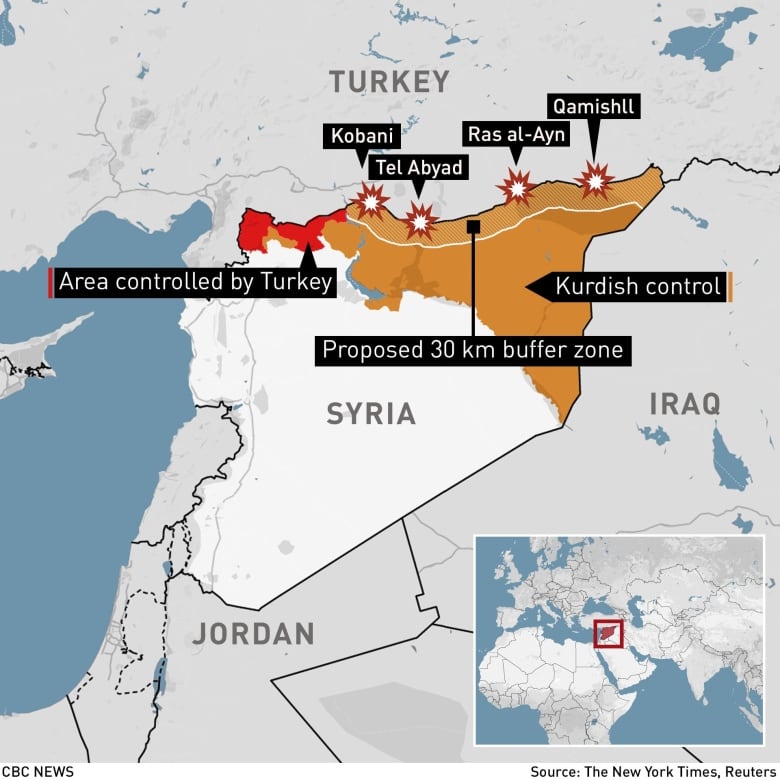Turkey presses assault against Kurdish forces in northern Syria
UN refugee agency says tens of thousands of civilians in Syria are fleeing violence

Turkey pressed its assault against Kurdish forces in northern Syria on Thursday for a second day, pounding the region with airstrikes and an artillery bombardment that raised columns of black smoke in a border town and sent panicked civilians scrambling to get out.
Residents fled with their belongings loaded into cars, pickup trucks and motorcycle rickshaws, while others escaped on foot. The United Nations refugee agency (UNHCR) said tens of thousands were on the move, and aid agencies warned that nearly half a million people near the border were at risk.
The Turkish air and ground assault was launched three days after U.S. President Donald Trump opened the way by announcing U.S. troops were to be withdrawn from positions near the border alongside their Kurdish allies.
At a time when Trump faces an impeachment inquiry, the move drew swift criticism from Republicans and Democrats in Congress, along with many national defence experts, who say it has endangered not only the Kurds and regional stability but U.S. credibility as well. The Syrian Kurdish militia was the only U.S. ally in the campaign that brought down ISIS in Syria.
Watch as smoke rises from the Syrian border towns of Tel Abyad and Ras al-Ayn:
Trump has asked Turkey for moderation during its assault and to safeguard civilians. But the opening barrage showed little sign of holding back; the Turkish Defence Military said its jets and artillery had struck 181 targets so far.
We defeated 100% of the ISIS Caliphate and no longer have any troops in the area under attack by Turkey, in Syria. We did our job perfectly! Now Turkey is attacking the Kurds, who have been fighting each other for 200 years....
—@realDonaldTrumpFailure to protect "vulnerable populations" and contain ISIS militants in northern Syria will have "consequences" for Turkey, Kelly Craft, the U.S. envoy to the United Nations said Thursday. She said Trump has made it "abundantly clear" the U.S. does not endorse Turkey's military operation in Syria "in any way."
More than a dozen columns of thick smoke rose in and around the town of Tel Abyad, one of the offensive's first main targets. Turkish officials said the Kurdish militia has fired dozens of mortars into Turkish border towns the past two days, including Akcakale.
Turkish officials said a nine-month-old and a civil servant were killed by mortars striking towns inside Turkey.
On the Syrian side, seven civilians and eight Kurdish fighters have been killed since the operation began, according to activists in Syria.
It was a wrenchingly familiar scenario for the many who, only a few years ago, had fled the advances on their towns and villages by ISIS.
2 villages 'cleared of terror,' state media say
Turkey's state-run news agency said Turkey-allied Syrian opposition fighters have "cleared of terror" two villages across the border in Syria — meaning there are no more Syrian Kurdish fighters in those villages.
Turkey's Defence Ministry said 174 "terrorists" have been "neutralized" in the military operation, referring to Syrian Kurdish fighters. The ministry tweeted Thursday that the number includes 19 alleged fighters killed in an airstrike on a shelter used by the Syrian Kurdish People's Protection Units, or YPG, in Ras al-Ayn. The numbers could not be independently verified.

A Kurdish-led group and Syrian activists claimed Thursday that despite the heavy barrage, Turkish troops had not made much progress on several fronts they had opened over the past hours. But their claims could not be independently verified, and the situation on the ground was difficult to assess.
Turkish President Recep Tayyip Erdogan warned the European Union not to call Ankara's incursion into Syria an "invasion," and renewed his threat of "opening the gates" and letting Syrian refugees flood Europe.
The U.K.-based Syrian Observatory for Human Rights said more than 60,000 people have fled their homes since Wednesday, while UNHCR called on parties to adhere to International Humanitarian Law — including providing access for aid agencies.
International aid agencies warned of an escalating humanitarian crisis, saying that civilians were at risk "as violence escalates."
Turkey won't tolerate Kurdish administration on border
Turkey began its offensive in northern Syria on Wednesday with airstrikes and artillery shelling, before ground troops began crossing the border later in the day. U.S. troops pulled back from the area, paving the way for Turkey's assault on Syrian Kurdish forces.
Turkey considers its operations against the Kurdish militia in Syria a matter of its own survival and has long insisted it won't tolerate a local Kurdish administration in Syria along its border. It says Kurdish fighters there are linked to its outlawed Kurdistan Workers' Party, or PKK, which has led an insurgency against Turkey for 35 years, killing tens of thousands.
Watch footage from the beginning of Turkey's offensive into Syria:
The PKK is considered a terror group by Turkey and its Western allies, including the U.S. Ankara has been infuriated by U.S. support for the Syrian Kurdish fighters, claiming Washington was arming an extension of a terror group — charges both the U.S. and the Syrian Kurds deny.
The Kurds on Thursday stopped all their operations against ISIS extremists in order to focus on fighting advancing Turkish troops, Kurdish and U.S. officials said.
Turkey said it intends to create a "safe zone" that would push the Kurdish militia away from its border and eventually allow the repatriation of up to two million Syrian refugees in the area.
With files from Reuters
